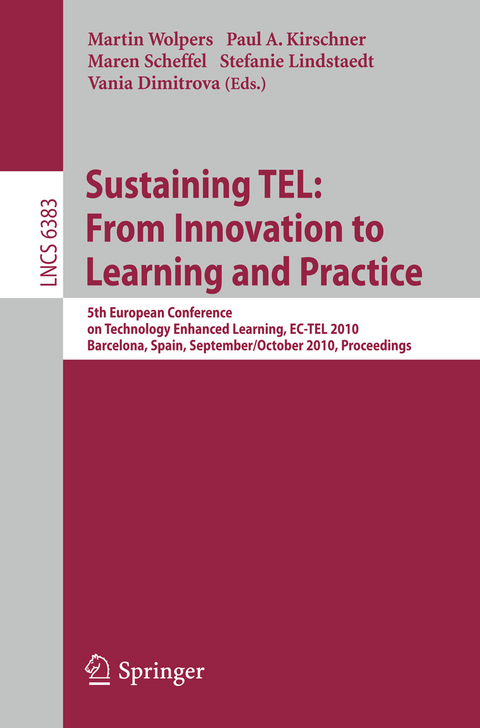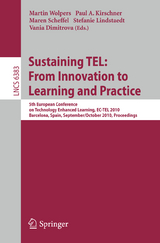Sustaining TEL: From Innovation to Learning and Practice
Springer Berlin (Verlag)
978-3-642-16019-6 (ISBN)
Section 1. Invited Papers.- Tackling HCI Challenges of Creating Personalised, Pervasive Learning Ecosystems.- Section 2. Full Papers.- Maintaining Continuity of Inquiry Learning Experiences across Contexts: Teacher's Management Strategies and the Role of Technology.- Ultra-Personalization and Decentralization: The Potential of Multi-Agent Systems in Personal and Informal Learning.- Learning Spaces as Representational Scaffolds for Learning Conceptual Knowledge of System Behaviour.- Investigating Teachers' Understanding of IMS Learning Design: Yes They Can!.- Task Performance vs. Learning Outcomes: A Study of a Tangible User Interface in the Classroom.- Content, Social, and Metacognitive Statements: An Empirical Study Comparing Human-Human and Human-Computer Tutorial Dialogue.- Authenticity in Learning Game: How It Is Designed and Perceived.- Orchestrating Learning Using Adaptive Educational Designs in IMS Learning Design.- Management of Assessment Resources in a Federated Repository of Educational Resources.- Knowledge Maturing Activities and Practices Fostering Organisational Learning: Results of an Empirical Study.- Demands of Modern PLEs and the ROLE Approach.- How to Share and Reuse Learning Resources: The ARIADNE Experience.- Towards Improved Support for Adaptive Collaboration Scripting in IMS LD.- Providing Varying Degrees of Guidance for Work-Integrated Learning.- Automatic Detection of Local Reuse.- Developing and Validating a Rigorous and Relevant Model of VLE Success: A Learner Perspective.- The Design of Teacher Assistance Tools in an Exploratory Learning Environment for Mathematics Generalisation.- Representing the Spaces When Planning Learning Flows.- Studying the Factors Influencing Automatic User Task Detection on the Computer Desktop.- Learning 2.0Promoting Innovation in Formal Education and Training in Europe.- Extended Explicit Semantic Analysis for Calculating Semantic Relatedness of Web Resources.- Leveraging Semantic Technologies for Harmonization of Individual and Organizational Learning.- Learning from Erroneous Examples: When and How Do Students Benefit from Them?.- Enhancing the Learning Process: Qualitative Validation of an Informal Learning Support System Consisting of a Knowledge Discovery and a Social Learning Component.- Section 3. Short Papers.- Pattern-Mediated Knowledge Exchange in Non-Governmental Organizations.- Modelling a Stakeholder Community via a Social Platform: The Case of TELeurope.eu.- Scenario-Based Multi-User Virtual Environments: Productive Failure and the Impact of Structure on Learning.- Experimentation and Results for Calibrating Automatic Diagnosis Belief Linked to Problem Solving Modalities: A Case Study in Electricity.- Exploring Mediums of Pedagogical Support in an across Contexts Mobile Learning Activity.- Overview and Preliminary Results of Using PolyCAFe for Collaboration Analysis and Feedback Generation.- A Framework for the Domain-Independent Collection of Attention Metadata.- Who Students Interact With? A Social Network Analysis Perspective on the Use of Twitter in Language Learning.- Conditions and Effects of Teacher Collaboration within a Blended Professional Development Program for Technology Integration.- Enhancing Learning with Off-Task Social Dialogues.- Section 4. Poster Papers.- Audience Interactivity as Leverage for Effective Learning in Gaming Environments for Dome Theaters.- Free-Riding in Collaborative Diagrams Drawing.- Affordances of Presentations in Multi-Display Learning Spaces for Supporting Small Group Discussion.- Recommending Learning Objects According to a Teachers' Contex Model.- Preferences in Multiple-View Open Learner Models.- Supporting Free Collaboration and Process-Based Scripts in PoEML.- A Simple E-learning System Based on Classroom Competition.- Computerized Evaluation and Diagnosis of Student's Knowledge Based on Bayesian Networks.- An Interoperable ePortfolio Tool for All.- Disaster Readiness through Education - Training Soft Skills to Crisis Units by Means of Serious Games in Virtual Environments.- Ambient Displays and Game Design Patterns.- PWGL, Towards an Open and Intelligent Learning Environment for Higher Music Education.- Vicarious Learning from Tutorial Dialogue.- Computer-Supported Argumentation Learning: A Survey of Teachers, Researchers, and System Developers.- End-User Visual Design of Web-Based Interactive Applications Making Use of Geographical Information: The WINDMash Approach.- Supporting Reflection in an Immersive 3D Learning Environment Based on Role-Play.- Facilitating Effective Exploratory Interaction: Design and Evaluation of Intelligent Support in MiGen.- GVIS: A Facility for Adaptively Mashing Up and Representing Open Learner Models.- Introducing a Social Backbone to Support Access to Digital Resources.- Towards an Ergonomics of Knowledge Systems: Improving the Design of Technology Enhanced Learning.- Using Personal Professional Networks for Learning in Social Work: Need for Insight into the Real-World Context.- Deep Learning Design for Sustainable Innovation within Shifting Learning Landscapes.- Evaluation of the Software "e3-Portfolio" in the Context of the Study Program "Problem-Solving Competencies".- Components of a Research 2.0 Infrastructure.- Exploring the Benefits of Open Standard Initiatives for Supporting Inquiry-Based Science Learning.- Monitoring andAnalysing Students' Systematic Behaviour - The SCY Pedagogical Agent Framework.- Section 5. Demonstration Papers.- iAPOSDLE - An Approach to Mobile Work-Integrated Learning.- A Haptic-Based Framework for Chemistry Education.- Intelligent Tutoring with Natural Language Support in the Beetle II System.- ScenEdit: An Intention-Oriented Authoring Environnment to Design Learning Scenarios.- Skill-Based Scouting of Open Management Content.- The Complexity of Integrating Technology Enhanced Learning in Special Math Education - A Case Study.- TAO - A Versatile and Open Platform for Technology-Based Assessment.
| Erscheint lt. Verlag | 27.9.2010 |
|---|---|
| Reihe/Serie | Lecture Notes in Computer Science | Programming and Software Engineering |
| Zusatzinfo | XI, 649 p. 152 illus. |
| Verlagsort | Berlin |
| Sprache | englisch |
| Themenwelt | Mathematik / Informatik ► Informatik ► Theorie / Studium |
| Mathematik / Informatik ► Informatik ► Web / Internet | |
| Informatik ► Weitere Themen ► Hardware | |
| Schlagworte | Bayesian Network • Collaborative Learning • Communities of Practice • context-aware systems • Data Mining • E-Learning • Games • impairments • Information Retrieval • Knowledge • Knowledge Acquisition • knowledge base • Knowledge Discovery • knowledge management • Lifelong Learning • mobile systems • Modeling • multi-agent system • natural language • Natural Language Processing • Network Architectures • network infrastructures • OLAP • Personalisation • proving • semantic web • sensor networks • Social Computing • Story-Telling • ubiquitous computing • ubiquitous learning • Web 3.0 |
| ISBN-10 | 3-642-16019-0 / 3642160190 |
| ISBN-13 | 978-3-642-16019-6 / 9783642160196 |
| Zustand | Neuware |
| Informationen gemäß Produktsicherheitsverordnung (GPSR) | |
| Haben Sie eine Frage zum Produkt? |
aus dem Bereich




